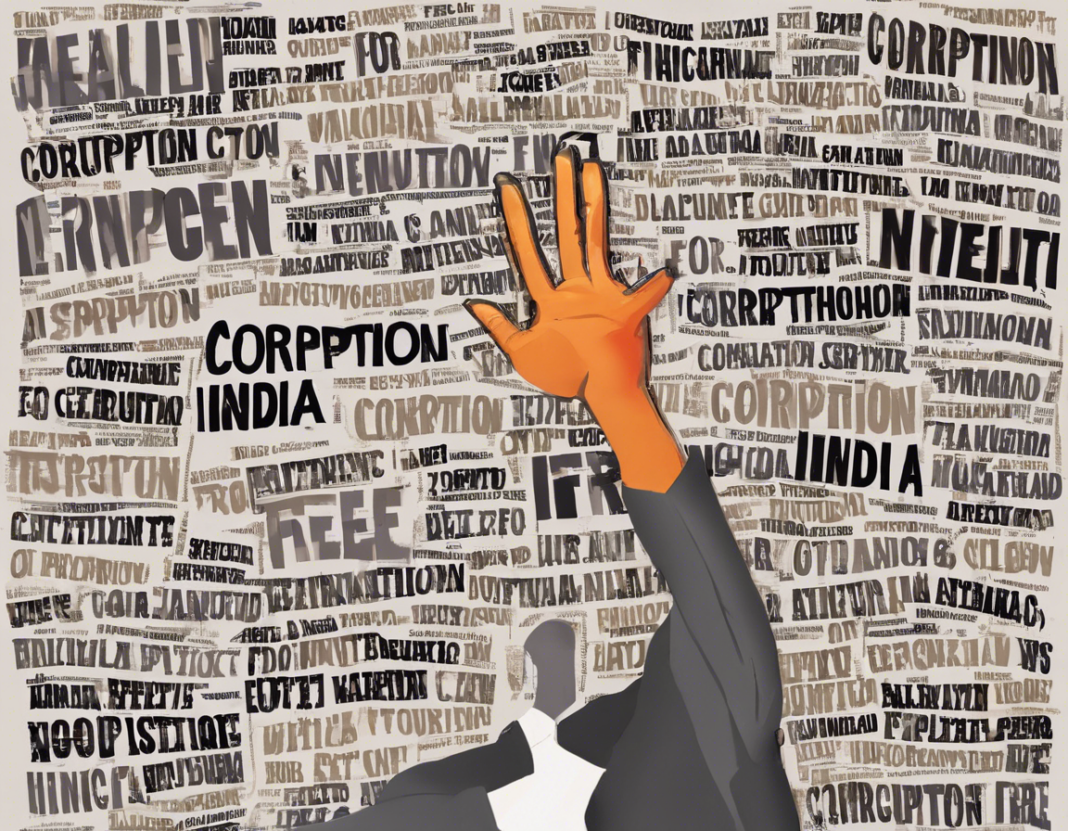Introduction
Corruption has long been a pervasive issue in India, hindering its progress and development. The deep-rooted problem of corruption in various sectors such as government, public services, and business has had detrimental effects on the country’s economy, governance, and social fabric. Despite efforts to curb corruption, India still ranks high on global corruption indices. In this blog post, we will delve into the importance of building a corruption-free India for sustainable development, the challenges in overcoming corruption, and the strategies to foster transparency, accountability, and integrity in the country.
The Impacts of Corruption on Development
1. Economic Consequences: Corruption distorts economic activities, deters foreign investments, increases the cost of doing business, and results in the misallocation of resources. It undermines the efficiency and effectiveness of public institutions, leading to substandard infrastructure, poor service delivery, and reduced public trust.
2. Social Implications: Corruption erodes the social fabric of society by perpetuating inequality, injustice, and social exclusion. It corrodes the rule of law, weakens institutions, and fosters a culture of impunity, where the powerful and well-connected evade accountability for their actions.
3. Political Fallout: Corruption undermines democracy by subverting the will of the people, eroding the credibility of elected officials, and distorting public policy priorities. It breeds cynicism and apathy among citizens, leading to a decline in civic engagement and trust in the government.
The Challenges in Combating Corruption in India
1. Institutional Weakness: India’s anti-corruption institutions lack independence, resources, and accountability, making them susceptible to political interference and manipulation. Strengthening these institutions and ensuring their autonomy is crucial for effective anti-corruption efforts.
2. Legal Framework: While India has enacted various laws to combat corruption, enforcement remains weak due to loopholes, delays in the judicial process, and the challenges of collecting evidence. Reforms in the legal framework and judicial system are essential to enhance deterrence and accountability.
3. Political Will: Political will and leadership are critical in the fight against corruption. However, vested interests, collusion between political and business elites, and the lack of political consensus on anti-corruption measures pose significant obstacles to meaningful reform efforts.
Strategies for Building a Corruption-Free India
1. Transparency and Accountability: Promoting transparency in government transactions, public procurement, and decision-making processes is essential to prevent corruption. Implementing measures such as open data initiatives, whistleblower protection laws, and asset disclosure requirements can enhance accountability and deter malfeasance.
2. Strengthening Anti-Corruption Institutions: Empowering anti-corruption agencies such as the Central Vigilance Commission, the Central Bureau of Investigation, and the Lokpal with adequate resources, independence, and investigative powers is crucial for investigating and prosecuting corrupt practices.
3. Citizen Engagement: Engaging citizens in anti-corruption efforts through awareness campaigns, social audits, grievance redressal mechanisms, and participatory decision-making processes can foster a culture of integrity, ethics, and civic responsibility. Civil society organizations, the media, and the private sector play a vital role in holding the government and businesses accountable.
4. Ethical Leadership: Fostering ethical leadership in government, business, and civil society is essential for setting the tone at the top and promoting a culture of integrity and accountability. Leaders who lead by example, adhere to ethical standards, and prioritize the common good over personal gain inspire trust and confidence in institutions.
5. International Cooperation: Engaging in international cooperation and sharing best practices in anti-corruption efforts can strengthen India’s capacity to combat transnational corruption, money laundering, and illicit financial flows. Joining initiatives such as the United Nations Convention against Corruption and the Financial Action Task Force can demonstrate India’s commitment to combating corruption globally.
Frequently Asked Questions (FAQs) on Combating Corruption in India
1. What are the factors contributing to corruption in India?
Corruption in India is fueled by factors such as bureaucratic red tape, lack of transparency, weak enforcement of anti-corruption laws, political patronage, and a culture of impunity.
2. How does corruption impact vulnerable populations in India?
Corruption disproportionately affects vulnerable populations in India by diverting resources meant for essential services such as healthcare, education, and social welfare, perpetuating poverty, inequality, and social exclusion.
3. What role can youth play in combating corruption in India?
Youth can play a crucial role in combating corruption by advocating for transparency, accountability, and good governance, participating in anti-corruption initiatives, and fostering a culture of integrity and ethical leadership.
4. How can technology be leveraged to combat corruption in India?
Technology can be leveraged to enhance transparency, accountability, and citizen engagement in anti-corruption efforts through e-governance solutions, digital platforms for reporting corruption, and blockchain for secure transactions.
5. What are the key anti-corruption laws in India?
Key anti-corruption laws in India include the Prevention of Corruption Act, the Lokpal and Lokayuktas Act, the Whistleblowers Protection Act, and the Right to Information Act, which aim to prevent, investigate, and prosecute corrupt practices.
In conclusion, building a corruption-free India is imperative for fostering sustainable development, promoting social justice, and restoring public trust in institutions. By addressing the root causes of corruption, strengthening anti-corruption mechanisms, promoting transparency and accountability, and cultivating a culture of integrity and ethical leadership, India can pave the way for a more equitable, prosperous, and democratic society.






